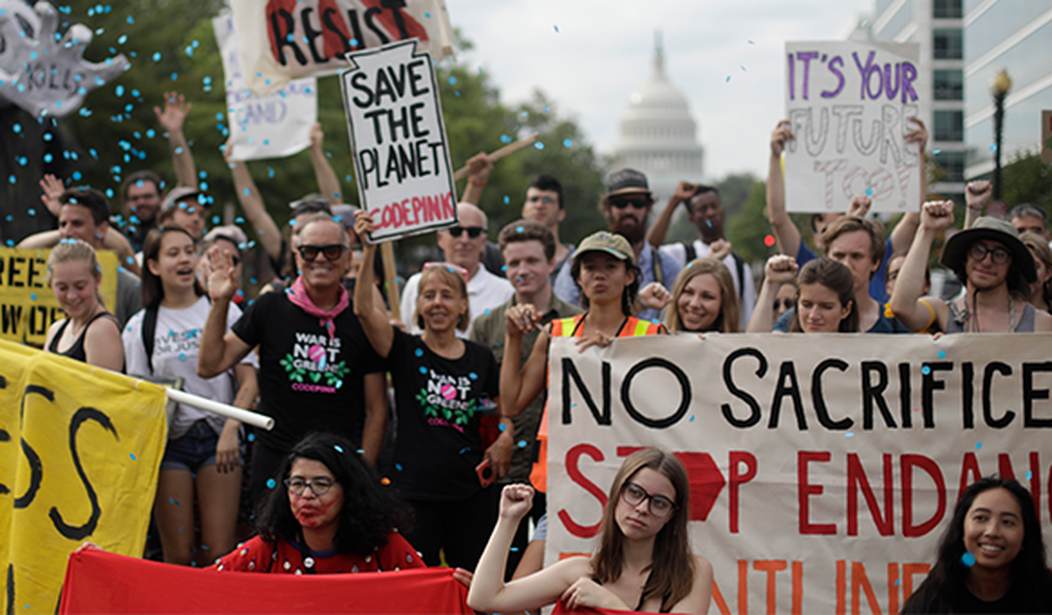The left has a new goal: degrowth.
We should "buy less stuff," forgive debts, grow our own food, etc.
They say this will "build a more just and sustainable society" and "save the planet" from "climate chaos."
This idea is popular with capitalism-haters.
One at a ChangeNow "eco conference" says, "A smaller, slower economy could also be a sweeter economy."
A sweeter economy? What nonsense.
We already unintentionally experimented with "degrowth."
During the pandemic, frightened politicians closed businesses and ordered people to stay home.
Growth stopped.
"Did that save us?" asks Swedish author Johan Norberg in my new video. "No. It was a terrible tragedy. Sixty million people were thrown into extreme poverty."
Yet some "degrowth" activists call the pandemic a good thing. "Did a lot of environmental good," says one on Al Jazeera. "Pollution has been radically cut, emissions have plummeted," says another.
It's true. The pandemic did reduce carbon emissions.
"But by no more than 6%!" says Norberg. "If we wanted to reduce global warming," he says, "We would need one pandemic every year. And that would be a terrible disaster for human life and health."
Sure would.
Climate change may be a serious threat. But reducing global growth won't help. It would make things worse. Growth and that much-hated capitalism are our only hope to create the wealth that may help us better adjust to climate change.
Norberg points out, "If we didn't have any economic growth since the 1950s, we would have slightly less global warming, but around half a million more people would die because of climate-related natural disasters. The risk of dying has declined by some 90%, and that's not because we have fewer disasters. ... It's because we've had economic growth. It means that we improve construction, improve early warning systems, improve health care ... we can deal with disasters in a better way."
Recommended
Over time, even a little growth makes a huge beneficial difference.
"If Sweden, my own country, had had just one percentage point lower economic growth per capita, then Sweden today would be as poor as Albania."
"What's wrong with Albania?" I ask.
"Albanians are a quarter as rich as Swedes," responds Norberg, "That shows in everything from life expectancy and child mortality to working conditions."
Albania's growth was stunted by years of communism. Because of that, today Albanians risk their lives to try to reach capitalist countries.
"That's what you need to know about different economic and political systems," says Norberg. "Look at where the refugees go. They always go from more socialist economies to capitalist economies. People risk their lives to get to freedom and prosperity."
The no-growth advocates don't acknowledge that. They despise capitalism, and don't see its benefits. We invited more than a dozen of them to come on Stossel TV to explain the evils of capitalism and describe how degrowth is better. Not one would.
I wish one would come to my studio to argue. I'd ask what he thinks about the claim Norberg makes in his newest book, "The Capitalist Manifesto." He says, "The global free market will save the world."
"That's grandiose," I tell Norberg.
"But it is saving the world," he says. "Bit by bit, step by step. Every day over the past 20 years, more than 130,000 people were lifted out of extreme poverty!"
That means economic growth freed millions from stoop labor, from burning manure for heat, from lives where they die young.
Not only did free markets release people from miserable poverty, when they did, they created conditions where people want to take care of the environment. It's why capitalist countries are less polluted than socialist ones. Only when you aren't worried about your next meal can you start thinking about preserving nature.
On top of that, growth may give us the technology to reduce pollution and adjust to climate change.
Degrowth would leave the world poor, miserable and polluted.

























Join the conversation as a VIP Member